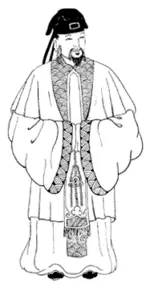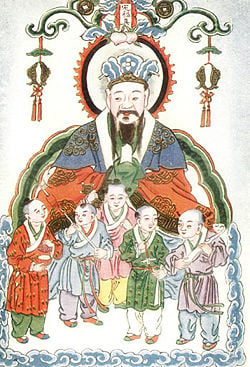Zao Shen
In Chinese folk religion and Chinese mythology, the Kitchen God, named Zao Jun (Chinese: 灶君; pinyin: Zào Jūn; literally "stove master") or Zao Shen (Chinese: 灶神; pinyin: Zào Shén; literally "stove god"), is the most important of a plethora of Chinese domestic gods (gods of courtyards, wells, doorways, etc.). It is believed that on the twenty third day of the twelfth lunar month, just before Chinese New Year he returns to Heaven to report the activities of every household over the past year to the Jade Emperor (Yu Huang) who rewards or punishes each household accordingly.
The Story of Zao Jun
Zao Jun has been worshiped as a god in China since at least the 2nd century B.C.E. There are several stories as to how he became a god, the most popular being that he was once a mortal man named Zhang Dan (張單) (also known as Zhang Ziguo 張子郭) and was married to a virtuous woman. However Zhang Dan fell in love with a young girl and left his wife for her. From that day on he was plagued with bad luck to punish him for his betrayal. He was struck blind, the young girl left him and he had to resort to begging.
One day, while begging for alms, he happened across the house of his former wife. Being blind, he did not recognize her. Despite his shoddy treatment of her, she took pity on him, and invited him in. She cooked him a fabulous meal and tended to him lovingly, he then related his story to her. He began to cry, and as he cried his eyesight was miraculously restored. Recognizing his benefactress as his former wife, he was overcome with shame and threw himself into the kitchen hearth not realizing that it was lit.
His wife tried to save him but he was consumed by the fire and all that was left of him was a leg (to this day in China a fire poker is sometimes called Zhang Dan's Leg). His wife lovingly created a shrine to him above the fireplace where he died, this began Zao Jun's association with the stove in Chinese homes.
Alternatively Zao Jun was a man so poor he was forced to sell his wife. Years later he unwittingly became a servant in the house of her new husband. Taking pity on him she baked him some cakes into which she had hidden money, but he failed to notice this and sold the cakes for a pittance. When he realized what he had done he took his own life in despair. In both stories Heaven takes pity on Zhang Dan's tragic story and instead of becoming a vampirish Jiang Shi, the usual fate of suicides he was made the god of the Kitchen, and was reunited with his wife.
Worship and Customs
Traditionally every Chinese household would have a paper effigy of Zao Jun and his wife (who writes down everything that is said in the household over the year for her husband's report to Yu Huang) above the fireplace in the kitchen and this tradition is still widely practiced. Offerings of food and incense are made to Zao Jun on his birthday which is said to be the third day of the eighth lunar month and also on the twenty third day of the twelfth lunar month when he returns to Heaven to give his New Year's report, on this day also the lips of Zao Jun's paper effigy may be smeared with honey to sweeten his words to Yu Huang (or keep his lips stuck together). After this the effigy will be burnt to be replaced by a new one on New Year's day and firecrackers are lit to speed him on his way to heaven. If the household has a statue or a nameplate of Zao Jun it will be taken down and cleaned on this day for the new year.
Zao Jun in Literature
Zao Jun's story is interwoven with a feminist spin into the protagonist's story in Amy Tan's novel The Kitchen God's Wife.
Credits
New World Encyclopedia writers and editors rewrote and completed the Wikipedia article in accordance with New World Encyclopedia standards. This article abides by terms of the Creative Commons CC-by-sa 3.0 License (CC-by-sa), which may be used and disseminated with proper attribution. Credit is due under the terms of this license that can reference both the New World Encyclopedia contributors and the selfless volunteer contributors of the Wikimedia Foundation. To cite this article click here for a list of acceptable citing formats.The history of earlier contributions by wikipedians is accessible to researchers here:
The history of this article since it was imported to New World Encyclopedia:
Note: Some restrictions may apply to use of individual images which are separately licensed.

